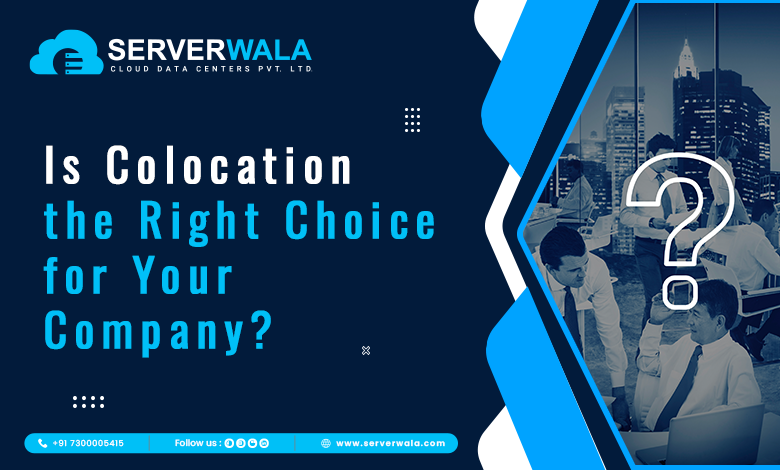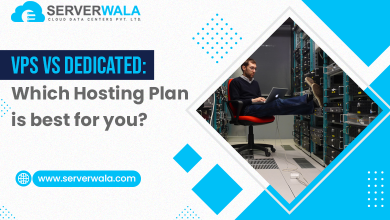Is Colocation the Right Choice for Your Company?

Introduction
In the advancing landscape of business technology, making the right choices for your company’s IT infrastructure is crucial. One such decision that often comes into play is whether to opt for colocation services. In this blog, we will delve into the world of colocation, exploring its definition, key features, and essential considerations to help you determine if colocation is the right choice for your company.
What is Colocation?
Colocation, often referred to as server colocation or colocation server hosting, is a strategic approach to housing your company’s servers and networking equipment in a third-party facility. This shift from managing an in-house data center to partnering with specialized colocation providers offers multifaceted advantages. It empowers organizations to leverage state-of-the-art infrastructure without shouldering the burden of maintenance.
This approach is not just about convenience; it’s a proactive strategy to optimize resources. Colocation facilities, strategically chosen based on colocation location and provider expertise, ensure that your servers operate in an environment engineered for peak efficiency. The benefits extend beyond technical aspects, encompassing cost-effectiveness and scalability.
In embracing server colocation, businesses unlock the potential for heightened security protocols and redundant systems. The colocation facility becomes a nexus of connectivity, offering high-speed internet connections and direct links to major network providers. This connectivity not only enhances overall performance but also positions your company for seamless expansion as it grows.
As the digital landscape evolves, the flexibility offered by colocation becomes a cornerstone for businesses aiming to navigate the complexities of IT infrastructure. Colocation services not only provide a secure and scalable home for your servers but also catalyze innovation. The decision to collaborate is not just a technical one; it’s a strategic move that aligns your company with the dynamic demands of the modern business environment.
What Are the Features of a Colocation Data Center?
When contemplating the adoption of colocation services, a nuanced understanding of the features within a colocation data center is pivotal. These facilities transcend conventional hosting environments, embodying advanced attributes tailored to elevate your server management.
Security:
Security within a colocation facility is paramount. Robust access controls, state-of-the-art surveillance systems, and redundant security protocols collectively fortify the environment. Colocation providers recognize the critical nature of safeguarding your data, and implementing measures that surpass industry standards. This commitment to security ensures a protected space for your servers, mitigating potential risks and vulnerabilities.
Redundant Power and Cooling:
Uninterrupted operation is the hallmark of a reliable colocation data center. Through the integration of redundant power sources and cutting-edge cooling systems, these facilities circumvent downtime caused by power outages or overheating. Colocation providers meticulously engineer their infrastructures to withstand unforeseen disruptions, offering a stable and resilient environment for your servers.
Connectivity Options:
Colocation services extend beyond mere hosting; they provide a gateway to enhanced connectivity. High-speed internet connections and direct links to major network providers constitute integral components. This connectivity not only augments the overall performance of your IT infrastructure but also ensures seamless communication and accessibility, fostering efficiency and responsiveness.
Scalability:
Colocation’s prowess lies in its innate scalability. As your business evolves, the flexibility to expand your IT infrastructure becomes a strategic advantage. Colocation facilities liberate businesses from the constraints of physical space, facilitating the seamless integration of additional servers or resources. This scalability feature is a catalyst for growth, allowing companies to adapt to changing demands without compromising operational efficiency.
24/7 Monitoring and Support:
Colocation data centers operate around the clock, providing continuous monitoring of servers and network infrastructure. This ensures early detection of issues, proactive troubleshooting, and swift resolution of any potential challenges. The inclusion of 24/7 support from experienced professionals adds an extra layer of assurance, guaranteeing that your critical systems are in capable hands at all times.
Customization Options:
Colocation services offer a level of customization that empowers businesses to tailor their IT environment according to specific needs. Whether it’s configuring network settings, implementing security protocols, or adjusting power allocations, the flexibility provided by colocation facilities allows for a bespoke solution that aligns seamlessly with organizational requirements.
Disaster Recovery Planning:
Colocation providers often incorporate robust disaster recovery planning into their services. This includes features such as data backup solutions, off-site storage options, and comprehensive recovery strategies. In the event of unforeseen incidents, businesses leveraging colocation services benefit from a structured approach to data protection and recovery.
Compliance and Certification:
Colocation data centers adhere to industry-specific compliance standards and certifications. This commitment ensures that your organization meets regulatory requirements related to data handling and storage. Colocation providers often undergo audits and assessments to maintain compliance, providing an added layer of assurance for businesses operating in regulated industries.
Considerations Before Implementing Colocation
Before delving into the realm of colocation services, a meticulous evaluation of various factors is crucial. These considerations not only shape the decision-making process but also determine the effectiveness of your colocation strategy.
Cost Analysis:
Conducting a comprehensive cost analysis is the cornerstone of any colocation decision. While colocation can indeed yield cost savings compared to maintaining an in-house data center, it’s imperative to delve into the specifics. Factor in upfront expenses, ongoing fees, and potential operational cost savings. Assessing the total cost of ownership (TCO) provides a holistic view, allowing for a well-informed decision aligned with your budgetary constraints and business objectives.
Technical Requirements:
The success of colocation hinges on the alignment of your company’s technical requirements with the capabilities of the chosen colocation facility. Scrutinize factors such as bandwidth availability, power requirements, and the physical space allocated. Moreover, anticipate future needs for expansion to ensure that the colocation environment can seamlessly accommodate your evolving IT infrastructure demands.
Compliance and Regulations:
Data security and legal compliance are non-negotiable aspects of colocation. Verify that the selected colocation facility adheres to industry-specific regulations and standards applicable to your business. This includes considerations for data handling, storage, and privacy. A colocation facility that prioritizes and maintains compliance provides a secure foundation for your business operations, mitigating risks associated with regulatory non-compliance.
Service Level Agreements (SLAs):
The foundation of a successful colocation partnership lies in the clarity and alignment of Service Level Agreements (SLAs). Thoroughly review the SLAs provided by colocation providers, scrutinizing terms, commitments, and performance guarantees. Understanding the service levels for aspects such as uptime, response times, and support ensures that your expectations are met. A transparent SLA forms the basis for a robust and reliable colocation relationship, fostering mutual trust and accountability.
Location Considerations:
The geographical location of the colocation facility is a strategic consideration. Proximity to your business headquarters, disaster recovery considerations, and regional connectivity all play a role. Choosing a colocation facility in an optimal colocation location enhances accessibility, reduces latency, and contributes to a resilient and geographically diverse IT infrastructure.
Redundancy and Reliability:
Evaluate the redundancy and reliability features offered by colocation providers. This includes considerations for backup power systems, network redundancy, and disaster recovery capabilities. A robust colocation facility ensures continuous availability, minimizing the impact of unforeseen disruptions on your business operations.
Scalability Options:
Anticipate future growth and assess the scalability options provided by the colocation facility. A scalable colocation environment allows your business to expand seamlessly, accommodating the evolving demands of your IT infrastructure without requiring a disruptive migration or relocation.
Network Connectivity:
Assess the network connectivity options available within the colocation facility. A well-connected data center with multiple carriers and diverse network paths enhances the resilience and performance of your IT infrastructure. Consider the availability of high-bandwidth connections and evaluate the facility’s ability to support your business’s connectivity requirements.
Environmental Controls:
Evaluate the environmental controls implemented within the colocation facility. This includes temperature regulation, humidity control, and air filtration systems. A stable and controlled environment is essential for the optimal performance and longevity of your servers and networking equipment.
Support and Expertise:
Investigate the level of support and expertise offered by the colocation provider. A responsive and knowledgeable support team is crucial for addressing technical issues promptly. Additionally, assess the provider’s experience and expertise in managing colocation services, ensuring they can effectively cater to your unique business requirements.
Also Read: What are Edge Data Centers? (Complete Guide)
Conclusion
In the ever-evolving landscape of business technology, colocation emerges as a compelling solution for companies seeking efficient and scalable IT infrastructure. By leveraging the features of a colocation data center, businesses can enhance security, scalability, and overall performance. However, before leaping, careful consideration of costs, technical requirements, compliance, and SLAs is imperative. With the right colocation facility, your company can position itself for seamless growth and innovation in the digital era.





